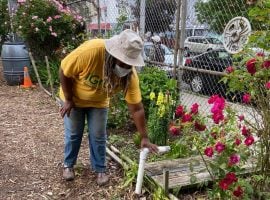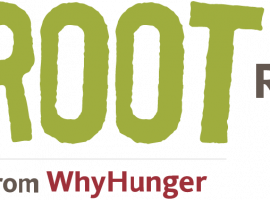Eighteen years ago, when urban agriculture was still considered an oxymoron — even among those working on food security issues — Jerry Kaufman was my champion, advocate and inspiration. After a long and distinguished academic career in urban planning and food systems, Jerry died yesterday surrounded by friends and family. He will be missed by so many of us.
 Jerry’s influence on my work – though certainly buoyed by his scholarship and the scholarship he inspired in others – was primarily through his stalwart support as an ally in my attempts as the first Urban Agriculture field coordinator for Heifer International. He took me and my work seriously when many others considered it quaint “community gardening.” When the city of Chicago impounded the goats the children were caring for in the Cabrini Greens housing project, he encouraged me to write an op-ed to the Chicago Tribune (which was published!), citing the economic and community development potential brought by farming in the city – especially one with a record 14,000+ vacant lots. When the residents of the infamous Robert Taylor Homes were being evicted wholesale so the buildings could be demolished, God’s Gang youth group, who raised worms and tilapia in the basement of one of the buildings — an early Heifer Project I supported — hung a 40-foot banner out the window with an image of a red wriggler that read: “Fighting Worms – We Won’t Be Evicted.” Jerry cheered and then instructed me in the link between urban agriculture, advocacy and social justice.
Jerry’s influence on my work – though certainly buoyed by his scholarship and the scholarship he inspired in others – was primarily through his stalwart support as an ally in my attempts as the first Urban Agriculture field coordinator for Heifer International. He took me and my work seriously when many others considered it quaint “community gardening.” When the city of Chicago impounded the goats the children were caring for in the Cabrini Greens housing project, he encouraged me to write an op-ed to the Chicago Tribune (which was published!), citing the economic and community development potential brought by farming in the city – especially one with a record 14,000+ vacant lots. When the residents of the infamous Robert Taylor Homes were being evicted wholesale so the buildings could be demolished, God’s Gang youth group, who raised worms and tilapia in the basement of one of the buildings — an early Heifer Project I supported — hung a 40-foot banner out the window with an image of a red wriggler that read: “Fighting Worms – We Won’t Be Evicted.” Jerry cheered and then instructed me in the link between urban agriculture, advocacy and social justice.
At every step of the way, Jerry made my forays into urban farming-cum-community development seem less and less crazy. His efforts to mainstream food systems as a sub-discipline within urban planning departments around the country, coupled with his capacity to bridge and carefully knit together grassroots efforts and academic rigor, made him a gem in the growing field of community food security and urban agriculture. He was just as much at home in the classroom as he was in the greenhouse.
I didn’t see much of Jerry over the last 10 years. We communicated by e-mail and passed on our news to each other through the occasional e-mail and even more frequently through Will Allen and Martin Bailkey — dear friends and colleagues that Jerry urged me to work with in the late ’90s. But Jerry’s importance to what would become my life-long commitment to and passion for food justice, local economies and community-based food security has never waned. I am grateful to him for the encouragement he gave me through his words, the doors he opened for me into circles where urban agriculture was being seriously discussed, the scholarship he undertook that justified my work, and the example he provided as a human being walking through the world with warmth, optimism and a calling to social justice.
Alison Cohen is Senior Director of Programs at WhyHunger.





